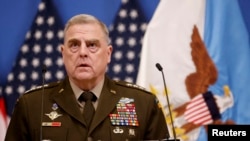WASHINGTON - There is still time to dissuade Beijing not to use force to reunify Taiwan with mainland China, according to America’s most senior military official.
The chairman of the Joint Chiefs of Staff, General Mark Milley, said Friday that despite well-publicized plans calling for the Chinese military to be ready to invade Taiwan by 2027, there is no indication Chinese President Xi Jinping has made a decision one way or the other.
Speaking to an audience at the National Press Club in Washington, Milley said that gives the U.S. and other countries time to show Xi the use of force would be a bad idea.
“You want to make sure that every single day, President Xi wakes up and says, 'Today is not that day,' and that that decision never comes,” he said.
Milley’s comments are in line with analysis from top U.S. intelligence officials, who have argued for much of the past year that Xi would prefer a peaceful reunification with Taiwan.
Some officials and analysts, however, have expressed concern that Russia’s invasion of Ukraine would prompt Beijing to risk war over Taiwan, with others warning China is likely learning lessons from Russia’s failures.
Milley on Friday said that as long as the U.S. and its allies are able to maintain their shrinking military advantage over China — and upgrade and modernize where necessary — Beijing can be persuaded to keep its forces on its side of the Taiwan Strait.
“The faster we move out, the faster we can retain military superiority, then I believe the theory of the case is we are more likely than not to deter war from happening, and if war does happen, we will prevail,” Milley said.
He also pushed back against criticism of the current U.S. approach to China and Taiwan, saying the U.S. and its allies have the capacity to support Ukraine and Taiwan, even though some of the needs overlap when it comes to weapon systems and ammunition.
“It’s not … a zero-sum game. It’s not like that,” Milley said, adding, “There are other allies and partners out there [to help Taiwan]. It’s not just the United States.”
Tensions between the U.S. and Chinese militaries have been rising steadily, going back to February, when the Pentagon accused China of flying a high-altitude spy balloon over the United States.
Chinese officials have insisted the device was a weather balloon, rejecting evidence from Washington that the equipment on board the balloon was meant for surveillance.
Complicating matters, Chinese military leaders have refused to speak with their U.S. counterparts.
Earlier this week, officials at the Chinese Embassy in Washington called on the U.S. to drop sanctions against China as a prerequisite for talks.
Pentagon officials Thursday rejected the demand.
U.S. officials have said they will continue to leave open the possibility for military-to-military talks, saying such communication is critical to prevent misunderstandings that could lead to conflict, something Milley alluded to Friday.
“The geostrategic history of this century will likely be determined by the United States-China relationship,” he said, “and whether it remains in competition or tips into a great power war.”






